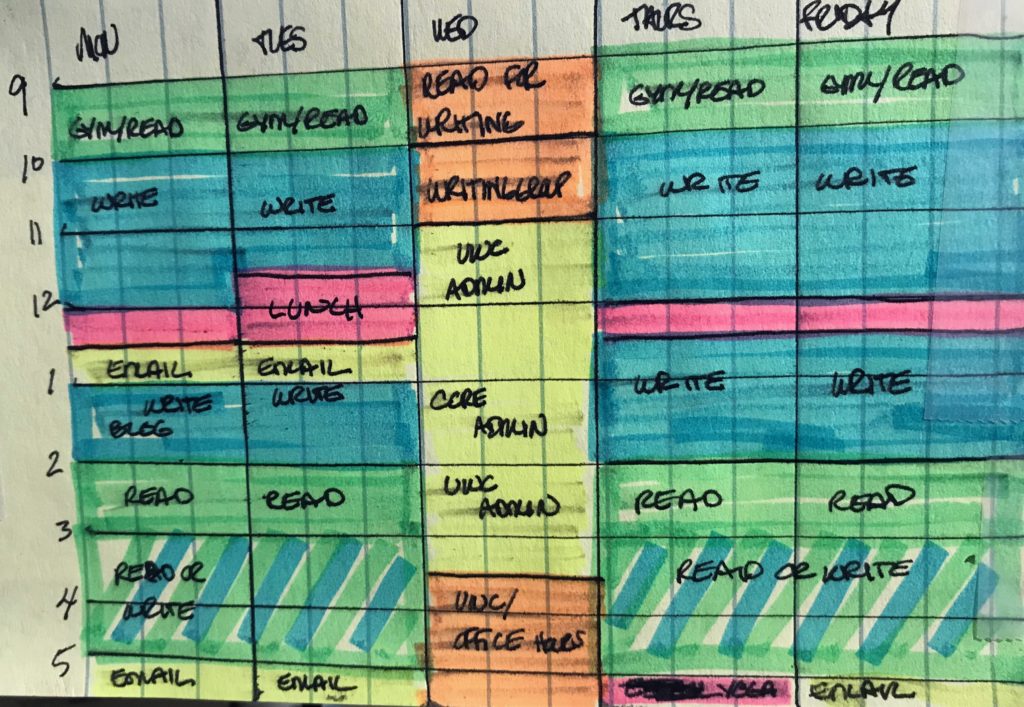
“A writer who waits for ideal conditions under which to work will die without putting a word on paper.” (E.B. White, “E. B. White, The Art of the Essay No. 1” Paris Review)
Reason #3 I wanted to retire early was so that I could finish a bunch of projects. One of them is about scholarly writing. Someone asked that I pull out the parts about procrastination–that was about 10k words. Even when I brutally whacked at it, it was 4k, which is just way too much for a blog post. So I’ve broken it into parts. Here’s the first.
I haven’t edited or rewritten it at all, and I wrote this almost six years ago. I tried to move footnotes into the texts, but it’s still wonky as far as citation. I didn’t want to put off posting it till it was perfect (the irony would be too much), so here goes.
Procrastination is conventionally seen as a weakness of will, a bad habit, a failure of self- control–narratives that imply punitive behavior is the solution. Those narratives ignore that procrastination isn’t necessarily pleasurable, and often doesn’t look like a bad decision in the moment. Putting off doing scholarship in favor of spending time and energy on teaching or service is not a lack of willpower, the consequence of laziness, or inadequate panic. But it is putting off tasks that Stephen Covey would call important but not urgent in favor of tasks that are important and urgent. Since it isn’t caused by lack of willpower or inadequate fear, it isn’t always solved by self-trash-talk or upping the panic.
Procrastination isn’t necessarily one thing, and so it doesn’t have one solution. Nor is it always a problem that requires a solution; dictating barely enough time to a task can ensure we don’t spend more time on it than is necessary can make a dull task more interesting, as it introduces the possibility of failure, and it can be efficient. I once tried preparing class before the semester began by doing all the reading and making lecture notes during the summer. I had to reread the material the night before class anyway, so the pre-preparing meant I spent more time on teaching, not less. Grading papers is a task that will expand to fill the time allotted, as I could always read a little more carefully, word my suggestions more thoughtfully, or give more specific feedback. Leaving the most complicated four or five papers till the morning of class means I had to get up at 4 in the morning, but it also meant I could only spend half an hour on each, and I was forced to be more efficient and decisive with my comments.
Many self-help and time managements books promise an end to procrastination, but that is an empty promise. As long as we have more tasks than time, we will procrastinate. The myth that one can become a perfect time manager who doesn’t procrastinate can inhibit the practical steps necessary to become more effective with one’s time. People who procrastinate because they don’t want to be drudges, and like the drama of the panicked writing, resist giving up procrastination, since it seems to suggest they have to become a different person. Some perfectionists procrastinate because they won’t let themselves do mediocre work—hoping to do perfect work, they may spend so much time doing one task perfectly that they get nothing else done, or they may wait till they feel they are capable of great work (if that moment never comes, they complete nothing), or they ensure that they have good excuses (such as running out of time) for having submitted less than perfect work. Unhappily, the same forces—the desire for a perfect performance—can inhibit the ability to inhabit different practices in regard to procrastination.
The perfectionist desire for procrastination can cause us to try to find the perfect system, product, or book–a quest that can will someone into a person who never gets anything done. It’s possible to procrastinate by trying all sorts of new systems that prevent procrastination. We can fantasize about ending procrastination—so that we will, from now on, do all tasks easily, effortlessly, promptly, and without drama—in ways that are just as inhibiting as fantasizing about writing perfectly scholarship. The point is not to become perfect, but to become better. The next few posts will describe some concepts and summarize some research that I found very helpful.
